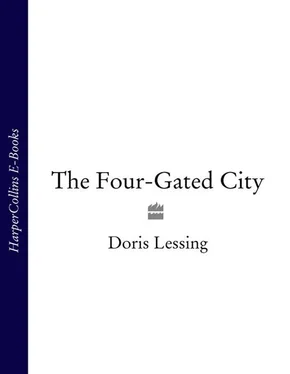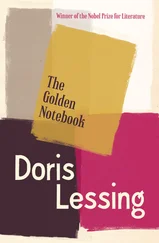She rang Jack. ‘Jack, this is Martha.’ ‘Oh, Martha, just a moment …’ So he was not alone. She waited. Outside the glass-apertured box in which Martha stood, people jostled, heads down, under their low weeping sky. Like cattle rushing forward into the dip on the farm: it was the same blind impelled movement. On a barrow at the corner, fruit – apples mostly. A pile of waxy-green apples with rain on them. And, crowning a pile of apples, a single bunch of grapes, displayed proudly on a wad of fibre. A single bunch of green grapes. In Cape Town grapes had dripped, dangled, overflowed, from barrows, carts, shops, a wealth of grapes, from which one bunch had flown overseas to land on this cart by the rubble near St Paul’s. As she held the receiver and watched, a woman picked up the bunch, decided it was too expensive, replaced it, and a single grape rolled down off the cart on to the pavement, lying like a pale green jewel among trampling feet. The sales boy, who had been looking desperate, dived for the grape, retrieved it, and with a quick look, wiped it on a bit of newspaper and then was about to put it back on the crown of grapes when a small child buttoned into a hooded raincoat stared at the grapes from eye level. He had probably never seen grapes at all. The youth pressed the grape into the child’s mouth. Smiles: from young mamma to youth, from mamma urging child to smile, at last, from child to youth: thank you. Apples were bought and the child went off on mamma’s hand, looking back at the bunch of translucent wet green grapes. ‘Martha, I’m so glad you telephoned, man, but where have you been?’ He was South African, but his accent had been fined down by much war-travelling. ‘Jack, I haven’t got anywhere to sleep tonight?’ A pause for calculations. ‘Just a tick, Martha, I must just …’ Again the other end of the phone had gone silent, but receptive: Martha could hear voices off somewhere, Jack’s, a girl’s. Jack was telling a story of some kind to the girl who was there. Or the truth, who knew? He came back. ‘It’s like this, Martha, I’m going to have to work till midnight.’ She laughed. Then, so did he. ‘Midnight would suit me fine.’ ‘See you, Martha.’ ‘See you, Jack.’
If she did not now ring Henry, she would take a bus to Bayswater and spend the evening drifting in and out of the pubs with the other visitors, migrants, freebooters. They would talk about England. That is, for a lot of the time, about Henry Matheson and what he stood for; and Iris and Stella and what they stood for. Someone would have a newspaper that jittered about the advent of red socialism in Britain, and how the working classes grew fat and luxurious, and how the upper classes dwindled into poverty. The aliens would look at the newspaper and talk about Iris and Stella, whom it appeared literate natives did not meet.
She rang Henry’s office. He was, said the telephone girl, just about to leave. This girl’s voice was a careful London suburban (Martha could already place it) and was exactly why she, Martha, if she accepted that job, would be working, not where she dealt with people on the telephone, but in an office where her merits would be of benefit to her fellow-workers and not, or at least not immediately, to the public.
Henry came to the telephone. ‘But my dear Martha, where have you been? I was just about to send out a search party!’ She laughed; convivial buccaneer with secrets she was prepared to share; and calculated whether she would be able to get away with just saying, even if for the third time: Henry, I’ve decided I don’t want that job.
‘Henry, I was ‘phoning to say I’ve done some serious thinking and thanks ever so much, I don’t think I’ll take the job.’ A pause. The two ‘wrong’ phrases, carefully planted into this arrangement of words to emphasize what Henry must find so hard to take in her, were doing their work. ‘Well, Martha … if you’re sure, but we would be so pleased to have you.’ ‘Yes, I’m sure …’ and now she made a mistake, from nervousness. ‘I’ve been working, as a matter of fact …’ Too late to think of a satisfactory lie, she had to go on, ‘In a pub.’ Silence. ‘How very enterprising of you. You did promise to ring, Martha. Look, how about a bite and a sup. Have you time?’ ‘Yes, I’d love to.’
‘How about Baxter’s? Do you know it?’ This meant, as Martha knew perfectly well, are you properly dressed for it?
‘Of course, how should I not know? It’s in all those novels about the twenties?’
‘Is it? Dear me. How very well read you are – so much, better than I am. Well then, if you get there before I do, tell old Bertie – he’s the head man, you know, that you’re supping with me.’
‘I’ll do that. In about an hour?’
‘Yes, we can have a drink first and you can tell me all your adventures.’
It was now raining hard: a dirty rain. Martha would have stayed in the box, but a girl was knocking on the door. Martha opened it. The girl had a wet headscarf and a thick, damp mackintosh. Beneath this disguise she was a pretty dapple-cheeked English girl. ‘Did you want to get out of the rain, or to telephone?’ A short offended laugh. ‘Actually to telephone.’ ‘In that case, I’ll leave.’ Another, but an appeased laugh. She watched Martha, wary, offering her smile like a shield. These were people totally on the defensive. The war? Their nature? But Martha was so clearly an outsider, breaking the rules with a smile in an alien accent, that had she persisted, talked, broken barriers, the girl would have enjoyed it, would have been grateful to have the defences broken, but also resenting, also wary, like an animal accepting overtures but ready to bite at a clumsy movement.
It was pouring. Martha went into a cigarette shop. The woman behind the counter raised eyes to Martha’s face and then looked at Martha’s feet. Water dripped from Mrs Van’s coat to the floor, which was already smeared and wet.
And now Martha thought – although it meant she would have instantly to leave the shop and go out into the rain, asked: ‘Can I have a dozen boxes of matches?’
Sullen: ‘You can have one box.’
‘Oh, I’d like a dozen. Half a dozen?’
‘There’s been a war on, you know.’
Martha had asked for three boxes of matches in a kiosk during her first week. Since then, she had made a point of asking for a dozen, in kiosks in every area of London.
‘There’s been a war on, you know.’
And with what hostility, what resentment. And what personal satisfaction. ‘I’m sorry, I was forgetting.’ ‘I suppose some people can.’
Martha got one box of matches in return for her tuppence, and smiled into a frozenly angry face. But the face said she must leave, must get soaked in punishment for her heartless indifference to the sufferings of her nation.
Martha left. A bus looked as if it might have room. She jumped on, and the conductor said: Hold on then, love. She smiled, he smiled. Disproportionate relief! She had discovered, swapping notes with other aliens in pubs, that it was not only she who had to fight paranoia, so many invisible rules there were to break, rules invisible to those who lived by them, that was the point. Warming herself at the conductor’s smile, the journey was made up Fleet Street, invisible behind cold rain, past Trafalgar Square, where lions loomed in a cold grey steam, and up to Piccadilly Circus, where the conductor sent her on her way with smiles, a wink, and an injunction to look after herself and enjoy her holiday.
It was with Henry that she had first seen this place, on a clear gold evening, the sky awash with colour. She looked at the haphazard insignificance of it, and the babyish statue, and began to laugh.
‘My dear Martha?’
‘This,’ she tried to explain, ‘is the hub of the Empire.’
Читать дальше












